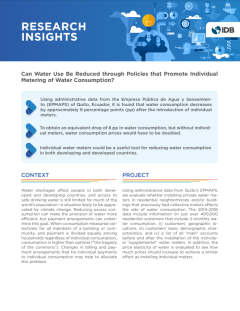
Water shortages affect people in both developed and developing countries, and access to safe drinking water is still limited for much of the world’s population, a situation likely to be aggravated by climate change. Reducing excess consumption can make the provision of water more efficient, but payment arrangements can undermine this goal.
This research evaluates whether installing private water meters in residential neighbourhoods and/or buildings that previously had collective meters affects the rate of water consumption. Using administrative data from the Empresa Pública de Agua y Saneamiento (EPMAPS) of Quito, Ecuador, it found that water consumption decreases by approximately 8% after the introduction of individual meters.
It concludes that individual water meters could be a useful tool for reducing water consumption in both developing and developed countries.
